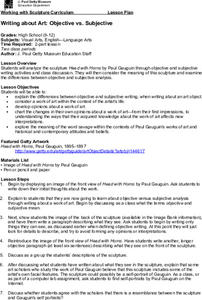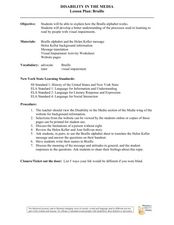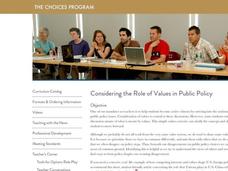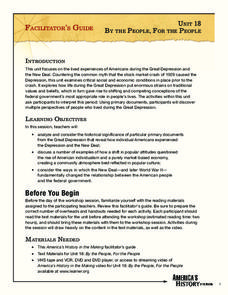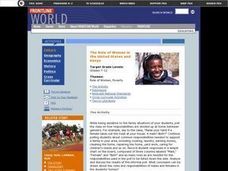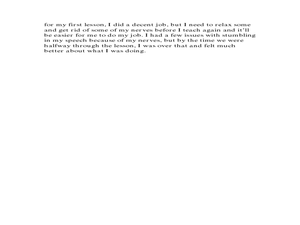Curated OER
Conceptual Analysis in Economics
Students practice critical thinking skills by defending their beliefs orally in a "hot seat". In addition, they communicate their feelings about an inssue in writing.
Curated OER
Communicating:A Two-Way Need
High schoolers engage an older adult in one-to-one contact. They develop communication skills that can be used in future interactions. They complete a handout and interview one older adult. They examine what society needs to do to help...
Curated OER
How Can Clear of Tress Destroy a Community?
Fifth graders brainstorm the relationship between trees and humans to determine how humans benefit from trees and how they benefit from us. They discuss oxygen/carbon dioxide exchange, soil stablization, animal habitat, shade, medicine...
Curated OER
Layers of the Rainforest
What a great way to discuss the rainforest! Learners discuss the importance of adaptation in the environment and how it is linked to survival. They use critical thinking and inference skills to place animals and insects in the different...
Curated OER
The Gay '80s, '90s and '00s
After reading and discussing a news article from the New York Times regarding gay and lesbian issues of the last thirty years, young scholars engage in several activities to explore current events. They create a timeline, either...
Curated OER
Writing About Art: Subjective vs. Objective
Explore objective and subjective writing in this interdisciplinary instructional activity, which brings language arts and visual art together. Middle and high school students examine the sculpture Head with Horns by Paul Gauguin. They...
Curated OER
"Uncle Sam's Got Himself in a Terrible Jam": Protest Music and the Vietnam War
"And it's one, two, three...what are we fighting for?" Use music to assess the climate of protest during the Vietnam War, listening to and analyzing Country Joe MacDonald's "I-Feel-Like-I'm-Fixin'-To-Die Rag" (lyrics included)....
Curated OER
Disability in the Media Lesson Plan: Braille
Students determine the workings of the Braille alphabet and how people with visual impairments learn how to use it. In this Braille lesson plan, students study the associated vocabulary, read about Helen Keller, and complete associated...
Teach With Movies
Learning Guide for: Glory
Invite your class to learn about the first regular US army unit composed of black soldiers during the Civil War with the film Glory. This website reviews the historical accuracy of the movie, offers pre- and post-viewing handouts, and...
Council for the Curriculum, Examinations and Assessment
Self Concept
Reflect on your identity, the past events that helped you form your personality, and your future aspirations with a lesson about self concept. Eighth graders examine their own traits and the ways they are unique from their peers before...
Brown University
Considering the Role of Values in Public Policy
Strong opinions come from deeply held values. Young citizens explore the values that are most important to them in a class discussion and activity. As they prioritize a list of values cards that include freedom,...
University of North Carolina
Modals
If you could have any job in the world, what would it be? Modal verbs such as could and would express possibility, as the installment of a compilation of informational handouts describes. A series of tables help explain the strength,...
Annenberg Foundation
By the People, For the People
A picture speaks a thousand words—no matter how old. The 18th installment of a 22-part series on the making of American history has scholars research the causes of the Great Depression and the factors of the New Deal. Using photographic...
Community High School of Vermont
Habits of the Mind
An informative one-page resource details the 16 Habits of Mind. Habits encourage positive problem-solving, self-awareness, creativity, and dedication—lifelong skills that can be used in both academic and social settings.
Facebook
Pop Imagination
Popular culture can pack a powerful punch when it comes to creating awareness around an issue! Teams collaborate to create a pop-culture-themed message during a digital citizenship instructional activity. Part of a vast library of...
District 186 Springfield Public Schools
Tone, Mood, Theme, and Motif
It's all well and good when you're asked to identify a speaker's tone using his or her body language, facial expression, and pitch and emphasis. Identifying the tone of a written passage is another challenge entirely. Check out an...
Reading Vine
Confucius: The Most Famous Teacher in China
Introduce young philosophers to the wisdom of China's most famous thinkers with a short bio. The reading comprehension passage includes an answer key.
Education Bureau of Hong Kong
Mental Models
Behaviors are often based on assumptions. That's the big idea in the third lesson of a series of critical think resources. Through a series of worksheets, learners examine the conscious and heretofore unconscious assumptions that...
Curated OER
The Cold War
Tenth graders explore the origins of the Cold War. In this Cold War lesson, 10th graders analyze selected songs and identify what historical events they reference. Students create a musical collage or timeline for the period...
Curated OER
The Role of Women in the United States and Kenya
Learners compare the responsibilities and rights of women in the US and in Kenya. They examine how gender affects societal roles.
Curated OER
A-Scripting We Will Go
Students write script for a puppet show. In this writing lesson plan, students write a puppet show script using facts from a previous lesson plan. They listen to DyAnne DiSalvo Ryan's, City Green before discussing the characters and...
Curated OER
Romeo And Juliet: Act III Reading And Study Guide
In this reading and study guide worksheet, students define 7 vocabulary words, define 4 literary terms, and respond to 32 short answer questions pertaining to Act III of "Romeo and Juliet" by William Shakespeare.
Curated OER
Reading and Study Guide: Romeo and Juliet Act III
In this reading and study guide worksheet, students define vocabulary and literary terms, find examples of literary term usage, and answer comprehension questions based on Romeo and Juliet, Act III.
Curated OER
Latent Learning
Students discuss childhood psychology by viewing a YouTube video. In this human behavior lesson, students identify latent learners and discuss reasons why some people fail to conform to society while others are quick to please everyone...







